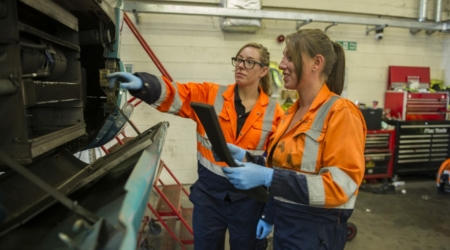The growth of the UK manufacturing industry
With all the uncertainty caused by the approaching Brexit, there are many industries that are suffering decline or stagnation across the United Kingdom. However, there are some industries that are bucking the trend, and instead, are benefiting from positive global conditions. One such industry is UK manufacturing, for which the future looks very bright, even in the face of uncertainty. In fact, now couldn’t be a better time to consider a career in this burgeoning sector. As the sector’s growth looks set to increase, the country is also likely to experience a growing demand for STEM studies and courses in Manufacturing and Engineering.
Having experienced a 1.4 percent average annual growth since the 1970s (Office for National Statistics, 2018), manufacturing is one of the country’s most steady and prosperous industries. The industry got off to a particularly good start in 2018, with manufacturing output increasing at its fastest rate since 2008, and having experienced growth for seven consecutive months (ONS, January 2018).
Thriving sub-sectors
So, what is causing this growth? While some sub-sectors of manufacturing are seeing a decline in output – such as building and construction – there are others that are keeping the industry buoyant.
Renewable energy
As part of its commitment to global environmental health, the UK has introduced an ambitious plan to cut down on consumption of fossil fuels. The 2020 renewable energy project is an agreement from the 28 EU countries. It is a commitment to a cumulative 20 percent of energy coming from renewable sources by 2020. The UK started from behind, with just 1.1 percent coming from renewable sources in 2004, but has pledged to reach 15 percent by 2020. This has spurred a massive growth and demand for alternative energy products and, as a result, the sector is booming. Demand in this area is only going to increase as well, as the UK will likely continue to up its target after the end of the 2020 campaign.
Transport sector
Britain’s transport sector remains strong, and its reputation for building world-class cars, boats and aeroplanes continues to grow stronger. In 2018, the automotive industry has remained strong, despite a few dips in production throughout the year, and continues to be a vital contributor to the country’s GDP (SMMT, 2018). Although the demand for vehicles in the UK remains sluggish, the automotive industry thrives from the strength of other large economies in Europe and the US, and export demand is on the up.
Meanwhile, the success of British aerospace companies is helping to boost the country’s manufacturing industry. The growth of the travel and aviation industry is leading to more routes globally, meaning more demand for new aircrafts. It is estimated that by 2018, the global aviation industry will reach up to 33.8 billion US dollars – a huge rise from the 8.3 billion US dollars it was worth in 2011. Between now and 2036, the number of passengers travelling by air is projected to grow by an average rate of 4.7 percent per year (IATA, 2017). All of this is good news for the aviation manufacturing industry – particularly in a country with a solid reputation, such as the UK, and ripe trading conditions.
Weaker pound
UK manufacturing on a whole is also being aided by the weaker pound. As Brexit draws closer, the country’s currency is at a seven-year low, meaning that it’s significantly cheaper for foreign countries to buy their goods from us. UK exports are now much more competitively priced compared to many other markets, opening us up to trade from around the world.
Global growth
Of course, the success of the UK’s manufacturing industry is heavily influenced by global growth. This year we are in a unique position whereby the three largest engines for world growth – China, the US and Europe – are all expanding at the same time. When this happens, exports such as vehicles typically increase. So essentially, our transport sector and other manufacturing sub-sectors will experience a higher production demand from overseas during this period. This more than makes up for the sluggishness that is experienced from within the country – where residents and businesses cut back or delay their spend while they wait to see what Brexit will bring.
Careers in manufacturing
With so much activity in today’s manufacturing industry, there is likely to be an increased demand for skills such as laser cutting, engineering and skilled labour. The sector offers a range of jobs with well-paid salaries, because it has typically suffered a shortage of qualified professionals along with a rising job market. And, with so many sub-sectors, the industry is likely to remain stable throughout uncertain times; when one sub-sector declines, there are others that will thrive, meaning that professionals can transfer their skills to where there is the most demand.









